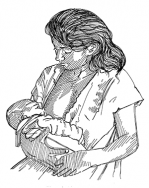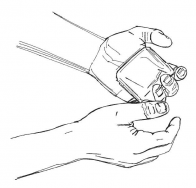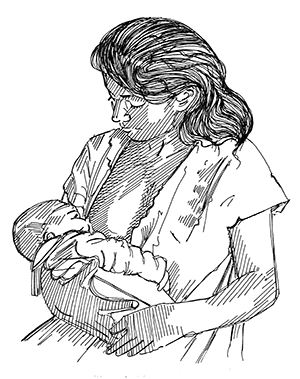13. Breastfeeding
13. Breastfeeding
Last update: 2023-03-31
Overview
- Breast milk is the best food for babies. The breast milk babies get immediately after birth is very healthy and helps to protect them from infections and illness. Mothers should be encouraged to begin breastfeeding as soon as the baby is born, and they should be urged and supported to continue to breastfeed. From birth to six months, breast milk is the only food a baby needs. After six months of age, when babies begin to eat other food, it is good to continue breastfeeding to add to the child’s diet until they are around two years old.
- Breastfeeding can save the lives of babies and young children in epidemics of diarrhoeal disease.
- It is always good to continue breastfeeding in epidemics because breast milk is a clean, nutritious, and free-of-charge food for babies.
What to do and how to do it
Understand the context
- Familiarize yourself with any local cultural beliefs and practices that are obstacles to exclusive breastfeeding.
- Find out which community health workers and traditional birth attendants are promoting breastfeeding and work with them. They can help you understand whether mothers breastfeed exclusively or provide other foods/drinks to babies under six months of age; whether they start to breastfeed within the first hour of birth; whether they use bottles; or what women do if they struggle to breastfeed.
- Talk to community and religious leaders and to fathers about the importance of breastfeeding. Ask for their help to persuade mothers to breastfeed.
- Get to know all the families in your area that have babies less than six months old.
- In some contexts, parents may use formula milk as a breast milk substitute for various reasons. It is important to understand those reasons and to share information about the possible associated risks:
- Bottle-feeding can be dangerous if bottles or water used to prepare powdered milk are not very clean or are contaminated with germs.
- Formula milk companies often use false and misleading messages to sell and profit from their product (e.g. they may claim that the formula is more nutritious than breast milk). Be wary of their marketing strategies and make sure that parents have access to accurate information.
Social mobilization and messaging
During social mobilization activities and house-to-house visits, or when promoting health, let mothers know that exclusive breastfeeding protects their babies from diarrhoeal diseases and can prevent death.
- Repeat the same messages:
- Breastfeeding saves the lives of babies in epidemics of diarrhoeal disease.
- Always advise mothers to breastfeed.
- Exclusive breastfeeding should be encouraged for babies less than six months of age – this means the baby should get only breastmilk and nothing else
- Complementary breastfeeding should be encouraged for children six months to two years – this means the child can start to eat other things, but that they should still breastfeed to supplement, or add to, their diet.
- Talk to women to find out what support they need and the difficulties they face in continuing to breastfeed.
- Work with women and health workers to try to resolve their problems and concerns.
- There are many difficulties and problems a woman might face. Examples of difficulties are lack of adequate food and water for the mother; lack of social support for breastfeeding (example: breastfeeding not allowed in public, mother being unable to look after a baby due to work, husband or mother-in-law not supporting breastfeeding, etc.); baby not latching properly or suffering tongue tie; breast infections; etc.
- Depending on the problem(s) a woman identifies, volunteers can help by doing things such as:
- Advocating for safe spaces for breastfeeding
- Helping women find breastfeeding support groups in their communities
- Finding out if there are breastfeeding counsellors or educators in the community or at health facilities
- Advocating for healthy and adequate food for breastfeeding mothers
- Volunteer support actions will depend on the issues identified by the breastfeeding mother.
- Work with women and health workers to try to resolve their problems and concerns.
- After the epidemic is over, keep working to encourage breastfeeding.
Breastfeed exclusively from birth to six months
of age. After this age, introduce appropriate
food while continuing to breastfeed.
of age. After this age, introduce appropriate
food while continuing to breastfeed.


